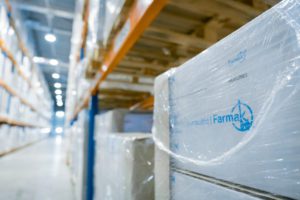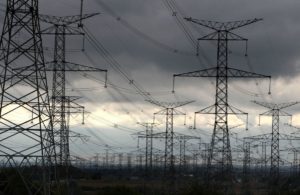
The first premium cinema of the Multiplex network will be opened in summer in Kyiv’s TsUM department store on the seventh floor and will have five halls with a total of 100 seats, the press service of the department store reported last week. According to a press release, the total area of the cinema will be 817 square meters. As reported, the total area of the seventh floor of the building with a zone of panoramic terraces, restaurants, bars and cafes is 3,500 square meters.
Multiplex-Ukraine plans to develop a new cinema format for the Ukrainian market from the point of view of the design of cinema halls, services and menus.
“Our network is represented by 129 halls in 15 regions of Ukraine. And we see great potential for further development: saturation is still far away. Even such an attractive place from the point of view of the solvent population, as the center of Kyiv, now suffers from a lack of cinemas and the situation has recently become only worse. In the center of Kyiv there is no newer and more attractive location than TsUM, so we immediately set ourselves the task of opening a cinema there,” CEO of PJSC Multiplex-Holding Vitaliy Pysarenko said.
As reported, at the end of 2016, ESTA Holding, the managing company of ESTA Group, established by CJSC System Capital Management (SCM, Donetsk), opened the eight-story Central Department Store (TsUM) with a total leasable area of 23,500 square meters after reconstruction.

One taxpayer declared over UAH 1 billion of income in Ukraine in 2018 and 4,810 taxpayers declared income over UAH 1 million last year, the State Fiscal Service reported on Monday. The youngest millionaire is seven years old and the oldest – 99, the authority said.
“The largest number of millionaires who submitted declarations is registered in Kyiv. Their number is 2,184 or 45% of the total number of millionaires,” the fiscal service said. The authority said that among leaders are Kyiv region with 333 people, Kharkiv region with 328 and Dnipropetrovsk region with 303.

PJSC Farmak by the end of 2019 plans to bring its products to the U.S. market, CEO Volodymyr Kostiuk said at a press conference on Friday.
“The share of our exports in 2018 amounted to 25% of total sales. We exported products to different countries, in particular, to countries in Europe, Africa, Asia and Australia. This year we plan to enter the U.S. market,” he said.
Kostiuk also said that Farmak plans to cooperate with the European Bank for Reconstruction and Development (EBRD) and increase investment in the development of innovative technologies of the company.
“Last year we invested about UAH 700 million in laboratories, in the development of new medicines, in IT. This year we are doing everything to increase investment. In particular, we have planned to invest about $35 million in the development of the IT laboratory. We start a lot of new projects. We also plan to actively cooperate with the EBRD,” Kostiuk said.
According to him, the company plans to expand its product line.
“The company is actively developing its product line. Every year we produce up to 20 new products. This year we plan to release 23 new products,” Kostiuk said.
PJSC Farmak is among Ukraine’s top three pharmaceutical producers and is a member of the Association Manufacturers of Medications of Ukraine (AMMU).
PJSC Farmak’s beneficiary is Chairperson of PJSC Farmak’s supervisory board Filia Zhebrovska. She owns 80% of the company’s shares.
In 2017, Farmak increased sales in the country’s retail pharmaceutical market by 21% in monetary terms. Its net profit grew by 29.9%, to UAH 839.09 million.

Electricity exports operations, which volume grows by 15-25% every year since 2016, is beneficial for Ukraine, Energy and Coal Industry Minister of Ukraine Ihor Nasalyk said in the parliament on Friday.
He said that electricity is exported at the price formed on the domestic wholesale market and includes not only subsidy certificates (the sums that households do not pay due to the fact that tariffs are lower than the production cost), but also the investment element of all Ukrainian power companies.
“With exporting electricity we settle internal problems at the expense of external consumers,” the minister said.
As reported, in 2018, Ukraine exported electricity for $331.942 million, which is 41% more than a year ago.